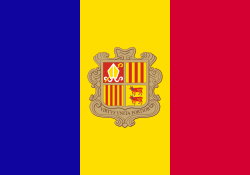This article needs additional citations for verification .(September 2024) |
| Andorra at the 2009 Mediterranean Games | |
|---|---|
 | |
| IOC code | AND |
| NOC | Andorran Olympic Committee |
| in Pescara | |
| Medals Ranked th |
|
| Mediterranean Games appearances (overview) | |
Andorra competed at the 2009 Mediterranean Games held in Pescara, Italy. [1]